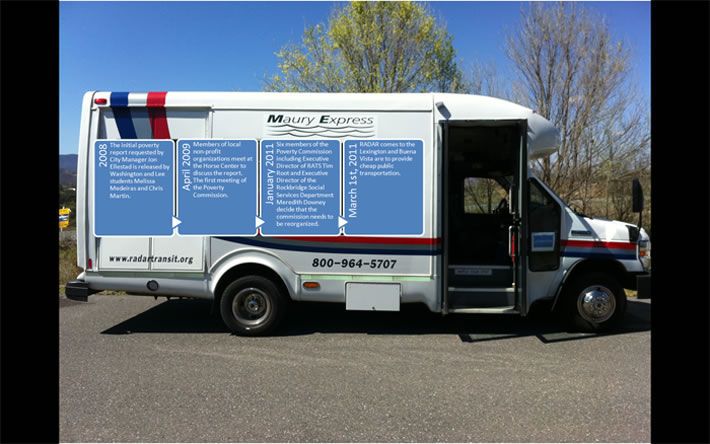
A timeline of the progress made by the Poverty Commission on a RADAR bus. Photo by Billy Crosby
Poverty Commission gets revitalized
By Billy Crosby
April 13, 2011
After almost dissolving in January, the Poverty Commission has started to rebuild and reorganize its goals with the help of local non-profit organization leaders. “We are working with a group of dedicated people in a way to try and refocus and revitalize the commission’s work,” said Executive Director of the United Way Phillip Thorpe.
The Commission grew out of a 2008 Shepherd Poverty Program student project. At the time, Melissa Caron Medeiros and Chris Martin wrote a 91- page report on the state of poverty in the Rockbridge area. The Rockbridge Poverty Assessment 2008 started a citywide reevaluation of the state of the community. The report focused on ten different areas of concern such as housing, hunger, economic development, and transportation.
Various local non-profit organizations including the Rockbridge Area Transportation System (RATS), Project Horizon, the Rockbridge Area Relief Association (RARA), the United Way, and members of the church community decided to get together to form the Poverty Commission in April 2009. The goals of this group were to connect all the local non-profit organizations and to raise awareness about the issues facing the area. Key leaders with the organization are RATS Executive Director Tim Root, Director of Rockbridge Department of Social Services Meredith Downey, and co-writer of the initial report Melissa Caron Medeiros.
Over time, however, the Poverty Commission began to lose some of its initial steam. “The structure that we had was not as effective as we thought it would be,” said Caron Medeiros. She said that the meetings were constantly rescheduled and the numbers of attendants began to dwindle. After taking a break in December, the group met in January and only six people showed up. “We looked at each other and said, ‘Is this dead or is it too good to let go?’ We decided that it was too good of a thing to just let it die,” said Root.
Root’s organization, RATS, has made progress in addressing the area’s transportation problem since the 2008 report. On March 1, RATS began a low-cost bus route in the area. Handled by Roanoke Area Dial-A-Ride (RADAR), the service makes hourly rounds between Lexington and Buena Vista where patrons can ride for only 50 cents. “We think of ourselves as the local solution to any transportation issues,” said Root. “When someone suggests that there is a problem that involves transportation we raise our eyebrows and listen closely.”
Even before the report came out, RATS was looking for a plan to provide more affordable public transportation. Root looked at a number of organizations that could come in and accommodate this service, but in the end went with RADAR because of its proximity to Lexington and its previous success. “It’s about solving the problems in the area and the RADAR system is one of the solutions,” Root said.
In addition to transportation, the Poverty Commission is looking at other areas of concern. “Economic development and lack of jobs are some of the issues that need the most attention. We need jobs in the community,” said Downey.
The Commission hopes to continue to raise awareness and reduce poverty in the area. “I think this is a key link in getting the community to have a far better understanding of what exists here,” said Downey. “I run into too many people who think there are no homeless people here. They just don’t see it.”
To hear more local and national news on poverty follow @OnPoverty on Twitter
Full text of the Rockbridge Poverty Assessment 2008
| Regional events calendar |
Local government websites: |
Produced by Washington and Lee digital journalism students.
![]()




